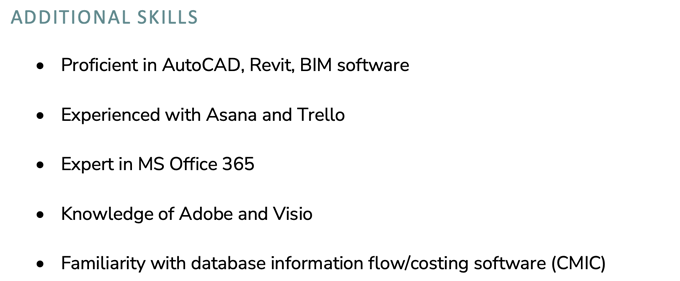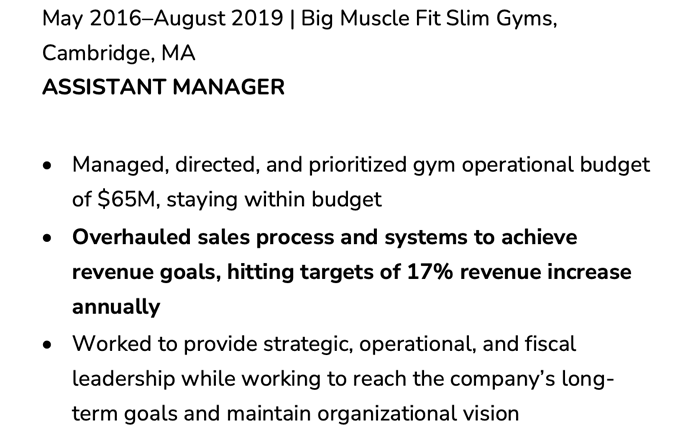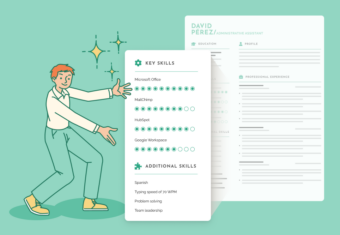What are project management skills?
Project managers are responsible for helping companies guide a project from planning to execution. They need to be able to assess risks, manage client expectations, and ensure team members can reach their full potential.
To be able to handle such diverse responsibilities, project managers require a good balance of soft skills and hard skills.
If you’re not sure what skills to include on your project manager resume, here are 15 key project management skills to know.
8 important soft skills for project managers
Even if you have the required technical skills to become an accomplished project manager, if you can’t communicate effectively or stay organized, you’ll struggle to keep up with the demands of the job.
Here are eight examples of soft skills that would be great to highlight when writing a resume for a project manager role:
1. Leadership
As the leader of the project, you must work with every member of your team and track their progress just as you would your own.
If someone isn’t meeting your expectations, it’s your responsibility to provide feedback and address any obstacles preventing them from reaching their goal. That’s why strong leadership skills are essential to success as a project manager.
2. Critical thinking
From budget shortages to changing client demands, obstacles are inevitable when you’re a project manager. You need to be able to think critically about problems and make quick decisions that will drive a project forward.
Think about when you’ve used available resources to find a solution in a high-pressure situation and include these career highlights on your project manager resume to show you have critical thinking skills.
Here’s an example of what this looks like in action:
3. Communication
As a project manager, you’re expected to communicate with a diverse set of stakeholders.
You’ll be reporting to your supervisor and clients, while also delegating work to other employees and contractors and must be able to explain concepts thoroughly and concisely to keep everyone updated.
That’s why having good communication skills are essential for any project manager.
4. Time management
Time management skills involve your ability to plan and prioritize tasks around a clear timeframe. This is essential for project managers because you’ll constantly be working with tight deadlines and have to complete projects on schedule.
Projects typically have several milestones leading up to a final due date, so you’ll need to track your team’s progress to ensure you finish on schedule.
You also have your own set of responsibilities, meaning you must be comfortable balancing multiple schedules throughout a project’s life cycle.
5. Mentoring
While leadership is primarily about delegation and building a cohesive unit of employees, mentorship involves coaching employees to improve their skills and reach their goals.
Consider mentoring an investment in your team; your projects will become more streamlined as your employees develop under your supervision.
6. Organization
Organizational skills are some of the most vital project manager skills, because you’ll have to coordinate each member’s work and ensure that the project is in scope, on time, and within budget.
There are a lot of moving pieces throughout the life cycle of a project, and it’s your primary responsibility to keep them moving in an organized fashion.
7. Risk management
Each project has the potential for risks that can spring up unexpectedly. In addition to thinking on your feet, you must be able to show hiring managers that you can plan proactively.
Even if you don’t know what kind of problems might crop up, you can still implement backup plans so that you and your team can press on regardless.
8. Negotiation
Project managers often act as the go-between for everyone involved in a project — from clients to writers and designers. If a designer can’t meet a deadline, it’s your responsibility to tell the client. If the client requests something outside of the scope of the project, you must let them know it’s impossible or requires a budget increase.
Negotiation skills will be useful when you need to mediate in tricky situations and make sure that all parties leave with a result they’re okay with.
Top 7 technical project management skills
While soft skills are essential for any project manager, there are several relevant technical skills that will improve your ability to do your job well. When considering what skills to list on your resume, make sure you include both relevant technical and soft skills.
Below are seven critical hard skills to develop so that you can impress in the interview or on your project manager cover letter.
1. Cost management
Every project has a specified budget that you’re responsible for managing. This requires careful analysis of expected costs and regular check-ins to ensure you’re on track to stay within budget.
As a project manager, you’ll also need to recognize when the scope of a project is unrealistic within the given budget. In this case, you must analyze the project needs to determine how to save on costs — which could mean finding a new vendor with lower rates or cutting out a non-essential part of the process.
2. Data analysis
Analyzing data to increase productivity and improve your team’s work is one of the top skills for project managers.
This can include database management, resource management, financial analysis, and any other applications of data that you have experience working with.
3. Kanban
Kanban is a popular method of agile project management because it streamlines the process by tracking the status of tasks.
Kanban breaks down a project’s tasks into three main categories. There are many ways to name these categories, but they basically classify tasks as “to do,” “doing,” and “done.”
Some examples of Kanban software you should be familiar with as a project manager include:
- Trello
- JIRA
- ProofHub
- ClickUp
4. Computer skills
Knowing your way around a computer is a key project management skill, since you’ll need to communicate and collaborate efficiently via email, messenger apps, and more.
Basic knowledge of email and the internet is expected, but you should be familiar with other computer skills too.
In particular, collaboration programs like Dropbox, Asana, and Slack are critical for effective project management. You may also need to demonstrate knowledge of programs like WordPress and Adobe Creative Suite.
5. Performance tracking
Efficiency is key in successful project management. Performance tracking can reveal gaps in the workflow that prevent optimal productivity.
You’ll need to work closely with your team to evaluate their work from both quality and quantity standpoints. Work should meet your quality standards, but must also adhere to the schedule you’ve laid out.
Demonstrate your history of overseeing and assessing the work of others when you apply to a new job to show hiring managers you know how to keep a project on track.
6. Scrum management
After Kanban, scrum management is the most common method of agile project management.
As a process, scrum management divides large projects into smaller “sprints,” which allows your team to remain focused on their tasks. Instead of looking ahead to one big deadline, a project is broken down into manageable portions that provide clients with regular deliverables.
As the scrum master, you’ll be in charge of maximizing productivity and increasing the chance of success.
7. Project life cycle software
A project’s life cycle typically falls into four distinct stages: initiation, planning, execution, and resolution. Each company has its own terms for these stages and some break them down even further, so you’ll need to be familiar with the cycle used in your organization.
Understanding the life cycle is vital for creating flow within the project. Many software applications, such as Hubstaff or Wrike, can digitize your custom project life cycle and hiring managers will be on the lookout to see if you are versed in any of these programs.
If you are, be sure to include them in your project management skills list and specify the platforms you’re most familiar with. Here’s an example of what a project manager skills section looks like:

How to improve your project management skills
When it comes to improving your soft skills as a project manager, the best thing you can do is to be attentive to the feedback you get from your team.
Ask each team member how you can better support them during future projects, and adapt your management style based on their responses. Soft skills aren’t typically skills that can be taught in a classroom, you need to continually practice them on your own to improve.
As for developing your technical project manager skills, you’ve got a few different options:
- Get certified – The Project Management Institute issues several different certifications for project managers, including PMP (Project Management Professional), PMI-RMP (PMI Risk Management Professional) and DASM (Disciplined Agile Management Professional).
- Get a degree – Getting a Bachelor’s or Master’s degree is a good first step if you’re serious about a career in project management.
- Familiarize yourself with PM software – There are numerous project management software options out there. Do some research, try them out and learn what’ll work best for you and your team.
- Attend a workshop – Seek out in-person or online project management workshops that focus on a particular technical skill that you’d like to develop further.
Additional skills for a project manager
Here are more skills to add to your project manager resume:
Click to rate this article
4.9 Average rating
















